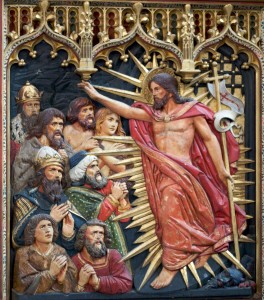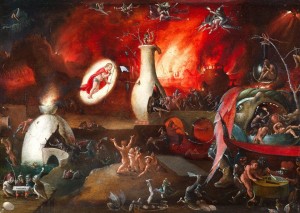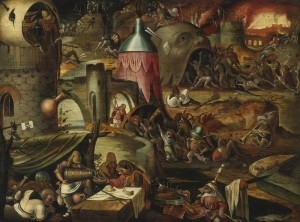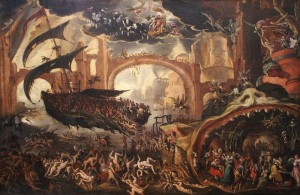“Then went in also that other disciple, which came first to the sepulchre, and he saw, and believed.” John xx:8
✠ In The Name of The Father and of The Son And of The Holy Ghost. Amen. ✠
Wrapt in the silence of the tomb
The great Redeemer lay
Till the revolving skies had brought
The third, th’appointed dayHell and the grave combined their force
To hold our Lord, in vain
Sudden the Conquerer arose
And burst their feeble chain-Isaac Watts
If you were present for the Good Friday meditations, I ask your forgiveness if I repeat myself for just a moment, but today more than perhaps any other day in the calendar year, context is of vital importance. We need to remember that although we are here this morning to celebrate the Resurrection of Jesus Christ, at the start of this morning’s Gospel reading, nobody is celebrating anything.
 Friday was a day of immeasurable grief, mourning, and defeat for the followers and family members of Jesus. As I said on Friday when delivering a meditation on Jesus’ seventh and final word from the cross, failure, disappointment, and mourning are the governing emotions here, not hope. The apostles are scattered, some already going into hiding. The Blessed Mother has watched her Son be crucified, the cruelest and most agonizing way to die. All of those who followed Jesus either as a would-be military leader who was going to conquer the Romans, or as an itinerant preacher who distilled the message of the Scriptures, have watched their hero and leader be led to His death. On Mt Calvary two thousand years ago, it would have appeared as though the ministry of this Jesus of Nazareth had failed horribly and cruelly. There is no “hope” to be found.
Friday was a day of immeasurable grief, mourning, and defeat for the followers and family members of Jesus. As I said on Friday when delivering a meditation on Jesus’ seventh and final word from the cross, failure, disappointment, and mourning are the governing emotions here, not hope. The apostles are scattered, some already going into hiding. The Blessed Mother has watched her Son be crucified, the cruelest and most agonizing way to die. All of those who followed Jesus either as a would-be military leader who was going to conquer the Romans, or as an itinerant preacher who distilled the message of the Scriptures, have watched their hero and leader be led to His death. On Mt Calvary two thousand years ago, it would have appeared as though the ministry of this Jesus of Nazareth had failed horribly and cruelly. There is no “hope” to be found.
And while we in the modern church have spent the last two days hopefully still in a state of meditation and reflection on this season, we know that this morning, the church would be full of flowers, the ladies would be wearing their most amazing hats, and the children would be tearing around the courtyard shrieking, looking for hidden eggs full of candy while their parents, with a sigh of defeat, tried to figure out how much benedryl will be necessary to get them to sleep later.

Harrowing of Hell, by Pieter Huys (c. 1519—c. 1584). From Wikipedia.
Peter of course rushes in. I’ve always liked Peter, he’s the first to rush into a freshly robbed grave site, and the first to cut the ear off a clergyman’s assistant; all in all, somebody we can identify with. But John—John waits. John surveys the situation cautiously. And the Scripture says “he saw, and believed.” Imagine if you will how this might have felt for the first time to John—he goes rushing to a tomb under the impression his dead friend’s body has been stolen, and leaves the tomb believing indeed (in a way previously unimaginable) that his friend was the Messiah, and had conquered death and the grave. He sees that the linens were not scattered about by grave robbers, but lying there as if undisturbed, Jesus’ body having been glorified and transformed.
But this word “believe” is a double-edged sword. As Christians, we are used to sometimes having our non-religious friends assure us, “oh, I believe in Jesus.” And because I identify much more with St Jerome than Saints Peter or John, I always have to bite my tongue to not say “well that’s excellent, but so does the devil.” Belief in Jesus is not noteworthy. A friend of mine is a Bible scholar, with a PhD in religious studies with a focus on apocalyptic literature, and an atheist. And although we don’t share any elements of faith, he’s an ardent defender of a lot of what people many in the church hold dear. Once, while engaging in an academic debate with somebody who was in the growing trend of denying everything about Jesus, Jack said, “Michael, you have to understand something. In my field, even we atheists can’t take these people any more seriously than you take somebody who walks around in a tinfoil hat, or who thinks the government listens to their thoughts through their fillings. In academic circles, belief in the person of Jesus of Nazareth is something rather beyond reproach.” So Jack, whose company you would enjoy and who has the dry wit of a classical Anglican though he isn’t one, believes. But the fact is, he doesn’t believe. He doesn’t believe the way Saint John believed on that first Easter morning two thousand years ago, and the way Jesus wants you and I to believe this morning.
We are here this morning, God willing, because we believe. We believe that Jesus literally conquered death on our behalf. We believe that death, which has haunted humanity since the fall, could not restrain Him. We believe that on that cross, He bore our sin, the sins of our fathers, and the sins even of our children, and our childrens’ children. And we believe that on that first Easter morning, Jesus Christ rose in the tomb, defeating death and the grave once and for all; for all of us. Not only that, we believe that in the interim, on the day we call Holy Saturday, He defeated Hell itself. In fact, Holy Saturday used to be referred to as “The Harrowing of Hell,” and as an aficionado of old horror movies, I find this to be a much more pleasing name for the day. In contemporary English, “harrowing” means “distressing.” But in olde English, a harrow was an agricultural tool for breaking up and turning over ground. Think about that—even in death, Jesus couldn’t get a day off. And it’s a good thing He defended labor on the sabbath during His earthly ministry, because labor on the sabbath He did! That’s why we say “he descended into hell” in the Apostle’s Creed; it wasn’t for His own punishment, but to break the very gates of Hell itself, and till up the ground thereof; to release those who waited for redemption. This is what Jesus did, on the sabbath, after mortal death, for mankind.
The Harrowing of Hell, by a follower of Jan Mandijn (c. 1500—c. 1560). From Wikimedia.
I would say I hope you had a nice Lent, but that’s not true. I hope what you had was a spiritually profitable Lent, which generally means you’ve been left a little tired, with some spiritual dead weight cut off, and your walk with the Lord strengthened. But now we rejoice. We rejoice in our salvation. We rejoice in our love and fellowship we have in this church and the church universal. But most importantly, let’s rejoice that we are invited to truly believe in hope and grace, and the healing power of Christ like the Apostle John two thousand years ago. Amen



